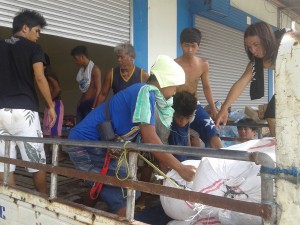
Tacloban City, Leyte – The challenge of achieving normalcy and finding a source of income after a disaster mostly falls on the shoulders of the fathers whose main responsibility is to ensure the safety and survival of their families.
With the recent disaster’s magnitude, it has been especially difficult for the men in Typhoon Yolanda-devastated areas, as they have been rendered jobless.
To help the affected families get back on their feet, the Department of Social Welfare and Development (DSWD) has been implementing the Cash-For-Work (CFW) scheme for repacking and hauling of relief goods at the different hubs in the region.
The CFW is an immediate response to provide means of earning to families affected by disasters. It is a recovery effort to aid families go back to their normal social functioning.
In exchange of helping in the repacking and hauling of goods, the CFW beneficiaries get paid based on the equivalent of the prevailing minimum regional daily wage.
Narciso Fabricante, 49, used to be a habal-habal (motorcycle) driver in his barangay in Palo. With almost all roads rendered impassable, Narciso lost his source of income.
Jobless and with six children to feed, Narciso and his wife relied on relief goods provided by DSWD. With his big family, he shared that they have learned to live daily with little food on the table.
“Six coconut trees fell down on our small house during the typhoon. It’s a good thing we have evacuated. If we didn’t, we could have died,” Narciso narrated in the local dialect.
When the weather cleared, he collected the materials left of their destroyed home and built a small hut for his family. He felt his family will be more comfortable in their own place rather than staying with relatives or neighbors
Narciso now works under the CFW.
Together with other men, he goes to the Tacloban City Seaport daily to help unload family food packs, canned goods and used clothing from cargo ships.
“We are glad that at least we can support our family better. We can now buy sufficient food for our children and not simply rely on relief goods,” Narciso said.
Rogelio Padal, 50, another father working at the seaport shares the same story.
He used to be a fisherman but has not gone back to fishing after the typhoon since his banca was destroyed.
For Rogelio, earning from the CFW program is already a big help for his family.
Narciso and Rogelio are just two of the more than 400 individuals who have already been mobilized by DSWD for CFW repacking and hauling activities.#


